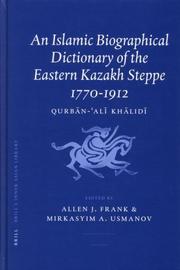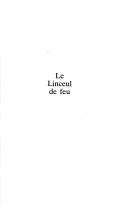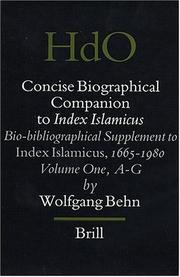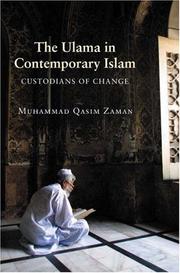| Listing 1 - 10 of 27 | << page >> |
Sort by
|
Book
ISBN: 1783084383 1783084367 Year: 2015 Publisher: London : Anthem Press,
Abstract | Keywords | Export | Availability | Bookmark
 Loading...
Loading...Choose an application
- Reference Manager
- EndNote
- RefWorks (Direct export to RefWorks)
Drawing on the work of Hegel, this book proposes a framework for understanding modernity in the Muslim world and analyzes the discourse of prominent Muslim thinkers and political leaders. Chapter by chapter, the book undertakes a close textual analysis of the works of Mohammad Iqbal, Abul Ala Maududi, Sayyid Qutb, Fatima Mernissi, Mehdi Haeri Yazdi, Mohammad Mojtaehd Shabestari, Mohammad Khatami, Seyyed Hussein Nasr and Mohamad Arkoun, drawing conclusions about contemporary Islamic thought with reference to some of the most significant markers of modernity.
Islam --- Muslim scholars --- Islamic scholars --- Scholars, Muslim --- Scholars
Book
ISBN: 0521206332 0521205476 0521205468 9780521206334 Year: 1975 Volume: 23-24 Publisher: Cambridge : Cambridge University Press,
Abstract | Keywords | Export | Availability | Bookmark
 Loading...
Loading...Choose an application
- Reference Manager
- EndNote
- RefWorks (Direct export to RefWorks)
Scholars, Muslim --- Biography. --- Suyuti, --- -Islamic scholars --- Scholars --- Biography --- Suyuti --- Muslim scholars --- -Biography --- Suyūṭī, --- Savants musulmans --- Scholars, Muslim - Biography. --- Suyuti, - 1445-1505.

ISBN: 9004141278 9789004141278 1429408464 9781429408462 1280915552 9786610915552 9047406478 9789047406471 Year: 2005 Volume: 12 Publisher: Leiden Boston Brill
Abstract | Keywords | Export | Availability | Bookmark
 Loading...
Loading...Choose an application
- Reference Manager
- EndNote
- RefWorks (Direct export to RefWorks)
This biographical dictionary, based on a Turkic manuscript compiled in 1912, is essential for all those interested in the Islamic history of Central Asia under Russian and Chinese rule. Covering the period from 1770 - 1912, it brings to life the muslim communities of Sufis and scholars of the eastern Kazakh steppe. Its extensive biographical information provides fresh insights into the intellectual, political, and religious life of a region for which indigenous Islamic sources are virtually unknown. With a historical and textological introduction, full English translation, extensive notes, and an Arabic-script Turkic text.
Islam --- Muslim scholars --- Muslims --- Mohammedans --- Moors (People) --- Moslems --- Muhammadans --- Musalmans --- Mussalmans --- Mussulmans --- Mussulmen --- Religious adherents --- Islamic scholars --- Scholars, Muslim --- Scholars --- Mohammedanism --- Muhammadanism --- Muslimism --- Mussulmanism --- Religions --- History --- Kazakhstan --- Dictionaries --- Biography
Book
ISBN: 1139049372 1108638937 1108625274 0521765951 Year: 2020 Publisher: Cambridge : Cambridge University Press,
Abstract | Keywords | Export | Availability | Bookmark
 Loading...
Loading...Choose an application
- Reference Manager
- EndNote
- RefWorks (Direct export to RefWorks)
Abdallah Azzam, the Palestinian cleric who led the mobilization of Arab fighters to Afghanistan in the 1980s, played a crucial role in the internationalization of the jihadi movement. Killed in mysterious circumstances in 1989 in Peshawar, Pakistan, he remains one of the most influential jihadi ideologues of all time. Here, in the first in-depth biography of Azzam, Thomas Hegghammer explains how Azzam came to play this role and why jihadism went global at this particular time. It traces Azzam's extraordinary life journey from a West Bank village to the battlefields of Afghanistan, telling the story of a man who knew all the leading Islamists of his time and frequented presidents, CIA agents, and Cat Stevens the pop star. It is, however, also a story of displacement, exclusion, and repression that suggests that jihadism went global for fundamentally local reasons.
Muslim scholars --- Revolutionaries --- Revolutionists --- Dissenters --- Counterrevolutionaries --- Islamic scholars --- Scholars, Muslim --- Scholars --- ʻAzzām, ʻAbd Allāh. --- Azzam, Abdullah --- ʻAzām, ʻAbdullāh --- عبد اللة عزام --- عبد الله عزام --- عزام، عبد الله --- عزام، عبد الله عزام --- Afghanistan --- Soviet Union --- History

ISBN: 2906480010 9782906480018 Year: 1987 Publisher: Paris Vegapress
Abstract | Keywords | Export | Availability | Bookmark
 Loading...
Loading...Choose an application
- Reference Manager
- EndNote
- RefWorks (Direct export to RefWorks)
Middle East specialists --- Muslim scholars --- Massignon, Louis, --- 325.8 --- 929 MASSIGNON, LOUIS --- Orientalists --- -Scholars, Muslim --- -Islamic scholars --- Scholars, Muslim --- Scholars --- Onafhankelijkheid. Streven naar zelfstandigheid. Onafhankelijkheidsbeweging. Dekolonisatie --- Biografie. Genealogie. Heraldiek--MASSIGNON, LOUIS --- Biography --- Massignon, Louis --- 929 MASSIGNON, LOUIS Biografie. Genealogie. Heraldiek--MASSIGNON, LOUIS --- 325.8 Onafhankelijkheid. Streven naar zelfstandigheid. Onafhankelijkheidsbeweging. Dekolonisatie --- -Onafhankelijkheid. Streven naar zelfstandigheid. Onafhankelijkheidsbeweging. Dekolonisatie --- -325.8 Onafhankelijkheid. Streven naar zelfstandigheid. Onafhankelijkheidsbeweging. Dekolonisatie --- Islamic scholars --- Massignon, Louis. --- Middle East specialists - France - Biography --- Muslim scholars - France - Biography --- Massignon, Louis, - 1883-1962

ISBN: 9004141170 9004150374 9004141898 9047418093 9047414357 9047413903 9789004141179 9789004150379 9789004141896 9789047418092 9789047413905 9789047414353 Year: 2004 Volume: 76/1-3 Publisher: Leiden Boston : Brill,
Abstract | Keywords | Export | Availability | Bookmark
 Loading...
Loading...Choose an application
- Reference Manager
- EndNote
- RefWorks (Direct export to RefWorks)
This first of the ultimately three-volume Who's Who in Islamic Studies presents the scholarly world at long last with its own biographical encyclopaedia. Taking as a starting point the inventory of authors from the renowned Index Islamicus , the author, Wolfgang Behn (Berlin), has systematically collected numerous data on the lives and works of the tens of thousands of authors listed in the Index Islamicus from 1665 to 1980. This Biographical Companion will be an indispensable reference tool for the serious student and scholar of Islamic Studies. It enables the user to quickly gain knowledge on the life, work, and professional background of almost every major and minor author, and thus to place each author in his/her proper perspective. A tremendous achievement and a true must for every library.
Muslim scholars --- Muslim authors --- Islamic literature --- Savants musulmans --- Ecrivains musulmans --- Littérature islamique --- Biography --- Dictionaries --- Bio-bibliography --- Biographies --- Dictionnaires anglais --- Dictionnaires --- Biobibliographie --- Scholars, Muslim --- Littérature islamique --- Dictionaries. --- Scholars, Muslim - Biography - Dictionaries. --- Muslim authors - Biography - Dictionaries. --- Islamic literature - Bio-bibliography - Dictionaries. --- Islamic scholars --- Scholars --- Muslim literature --- Religious literature --- Authors, Islamic --- Authors, Muslim --- Islamic authors --- Écrivains musulmans
Book
ISBN: 9789042921122 Year: 2008 Volume: 5 Publisher: Leuven Peeters
Abstract | Keywords | Export | Availability | Bookmark
 Loading...
Loading...Choose an application
- Reference Manager
- EndNote
- RefWorks (Direct export to RefWorks)
#SBIB:316.331H540 --- #SBIB:316.331H421 --- Godsdienstige actors: algemeen --- Morfologie van de godsdiensten: Islam --- Muslims --- Europe --- Intellectual life --- Muslim scholars --- Western countries --- Islamic learning and scholarship --- Christianity and other religions --- Islam --- Mohammedans --- Moors (People) --- Moslems --- Muhammadans --- Musalmans --- Mussalmans --- Mussulmans --- Mussulmen --- Islamic scholars --- Scholars, Muslim --- Learning and scholarship --- Muslim learning and scholarship --- Scholars --- Religious adherents

ISBN: 1282964682 9786612964688 1400837510 9781400837519 0691096805 9780691096803 9780691130705 0691130701 9781282964686 6612964685 Year: 2002 Publisher: Princeton, N.J. Princeton University Press
Abstract | Keywords | Export | Availability | Bookmark
 Loading...
Loading...Choose an application
- Reference Manager
- EndNote
- RefWorks (Direct export to RefWorks)
From the cleric-led Iranian revolution to the rise of the Taliban in Afghanistan, many people have been surprised by what they see as the modern reemergence of an antimodern phenomenon. This book helps account for the increasingly visible public role of traditionally educated Muslim religious scholars (the `ulama) across contemporary Muslim societies. Muhammad Qasim Zaman describes the transformations the centuries-old culture and tradition of the `ulama have undergone in the modern era--transformations that underlie the new religious and political activism of these scholars. In doing so, it provides a new foundation for the comparative study of Islam, politics, and religious change in the contemporary world. While focusing primarily on Pakistan, Zaman takes a broad approach that considers the Taliban and the `ulama of Iran, Egypt, Saudi Arabia, India, and the southern Philippines. He shows how their religious and political discourses have evolved in often unexpected but mutually reinforcing ways to redefine and enlarge the roles the `ulama play in society. Their discourses are informed by a longstanding religious tradition, of which they see themselves as the custodians. But these discourses are equally shaped by--and contribute in significant ways to--contemporary debates in the Muslim public sphere. This book offers the first sustained comparative perspective on the `ulama and their increasingly crucial religious and political activism. It shows how issues of religious authority are debated in contemporary Islam, how Islamic law and tradition are continuously negotiated in a rapidly changing world, and how the `ulama both react to and shape larger Islamic social trends. Introducing previously unexamined facets of religious and political thought in modern Islam, it clarifies the complex processes of religious change unfolding in the contemporary Muslim world and goes a long way toward explaining their vast social and political ramifications.
Muslim scholars. --- Ulama. --- Islamic scholars --- Scholars, Muslim --- Scholars --- Ulema --- Islam --- Muslim scholars --- Functionaries --- Ulama --- #SBIB:316.331H421 --- #SBIB:39A10 --- Morfologie van de godsdiensten: Islam --- Antropologie: religie, riten, magie, hekserij --- Islam and politics. --- Ulémas --- Islam et politique --- Political sociology --- Middle East
Book
ISBN: 1316852911 1316853616 1316855015 1316848442 1316853969 1107180996 1316632407 9781107180994 1316850811 1316853268 Year: 2017 Publisher: Cambridge : Cambridge University Press,
Abstract | Keywords | Export | Availability | Bookmark
 Loading...
Loading...Choose an application
- Reference Manager
- EndNote
- RefWorks (Direct export to RefWorks)
Hasan al-Turabi (1932-2016) was seen as one of the most influential figures in modern Sudanese history and politics. This book, based on extensive research and a thorough analysis of al-Turabi's own writings, provides a comprehensive study of the upbringing, ideas and political career of the Islamist intellectual and political leader. Balancing hostile and favourable accounts of al-Turabi, it challenges assumptions of the 'Marxist' or 'Fascist' dynamics underpinning Islamism, arguing that its colonial and post-colonial origins define the nature of Islamism's message. By encouraging readers to move away from generic models and limited readings of Islamism, Willow Berridge opens new and vital research for the understanding of Islamic politics across the Middle East and Africa. It makes for an ideal read for both undergraduate and postgraduate students focusing on the modern Sudanese state, and those challenging core debates on democracy, the Islamic State and Jihad.
Muslim scholars --- Politicians --- Islamic fundamentalism --- Fundamentalism, Islamic --- Islamism --- Islam --- Religious fundamentalism --- Statesmen --- Islamic scholars --- Scholars, Muslim --- Scholars --- Turābī, Ḥasan. --- Turabi, Hassan --- Al-Tourabi, Hassan --- Tourabi, Hassan Al --- -Alturabi, Ḥasan Abdallah --- Tarābī, Ḥasan --- Ḥasan Tarābī --- ترابي، حسن --- حسن الترابي --- حسن الطرابي --- Muslim scholars - Sudan --- Politicians - Sudan --- Islamic fundamentalism - Sudan --- Turābī, Ḥasan
Book
ISBN: 9791036561115 2853997936 Year: 2011 Publisher: Presses universitaires de Provence
Abstract | Keywords | Export | Availability | Bookmark
 Loading...
Loading...Choose an application
- Reference Manager
- EndNote
- RefWorks (Direct export to RefWorks)
La communauté indienne d’Afrique du Sud, présente depuis le xixe siècle, est divisée par religions (notamment hindouisme et islam). Cette division, mise à profit par l’apartheid, a eu pour effet de souder fortement la communauté musulmane. Dès lors, certains religieux, et notamment Ahmed Deedat, ont prôné une lutte idéologique contre le christianisme, parallèlement à un développement des services sociaux. Dépendant des aides financières du Pakistan et de l’Arabie Saoudite, Deedat n’a jamais remis en cause l’apartheid, système qui a permis son émergence. Sa polémique anti-chrétienne est pacifique et fondée sur le prêche, à la manière des évangélistes américains. Deedat, entièrement paralysé durant les dernières années de sa vie, a exercé une influence profonde sur la « prédication mondialisée ».
Muslim scholars --- Islam --- Christianity and other religions --- Relations --- Christianity. --- Islam. --- Deedat, Ahmed. --- Islamic scholars --- Scholars, Muslim --- Scholars --- Dīdāt, Aḥmad --- Didat, Ăkhmăt --- Didat, Akhmed --- Deedat, Ahmad --- ديدات، أحمد --- ديدات، احمد --- Afrique du Sud --- controverse --- religion --- hindouisme --- islam --- apartheid --- communauté musulmane --- christianisme --- prêche
| Listing 1 - 10 of 27 | << page >> |
Sort by
|

 Search
Search Feedback
Feedback About UniCat
About UniCat  Help
Help News
News